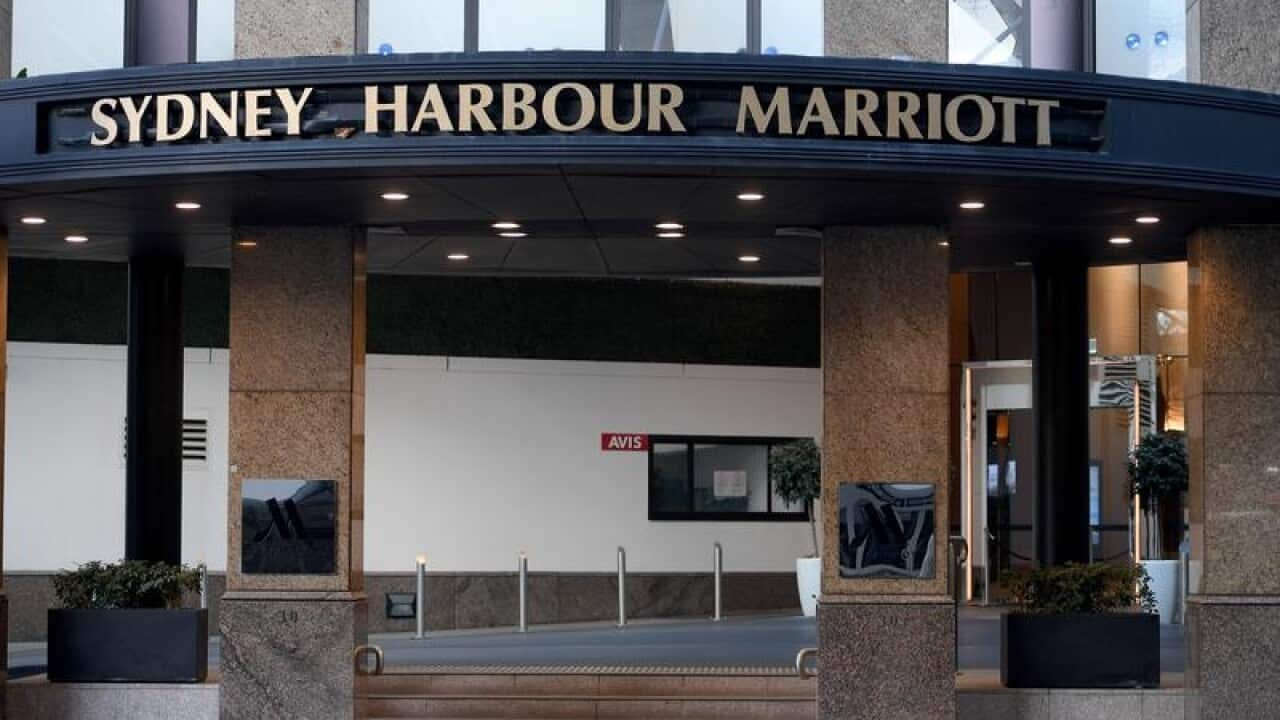A security guard who contracted COVID-19 while working in Victoria's hotel quarantine program was told to wear the same mask and gloves for the duration of his 12-hour shift because of a shortage of personal protective equipment.
The guard, known only as Security 16 for legal reasons, told Victoria's hotel quarantine inquiry he got the work over WhatsApp and was never trained in infection control or how to wear PPE.
He was first contracted by Silvans Security Pty Ltd to work at the Marriott and Novotel hotels in mid-April, where he was paid $26 an hour.
In May, he was subcontracted by SSG Security to work at the Rydges on Swanston hotel, which has been identified as the source of more than 90 per cent of current COVID cases in Victoria.
After two or three days working at the Rydges hotel, the man was told by a supervisor about the shortage of PPE.
"He instructed me to put my mask and gloves in my pocket when I went for a break. He told me not to put my mask and gloves in my pocket in front of the hotel's security cameras," the man wrote in his statement to the inquiry.
The man said he saw other security guards smoking together, while others "put holes in their gloves so that they could use their mobile phones".
Within days, he began developing symptoms for what he thought was a "common cold".
"I noticed some of the other guards were sniffing, but I thought that was because it was a cold night," the guard wrote.
He told the inquiry he wasn't fully aware of COVID-19 symptoms nor the need to tell a supervisor if he had them.
After his shift, he went to a hospital to get a test but felt better by the afternoon and made three or four food delivery orders.
He got a positive test result the following day and entered 14 days of self-isolation.
At the end of the 14 days, he was told by the Department of Health and Human Services he was free to leave his home, so he continued to make food deliveries.
He soon felt a shortness of breath and went to the hospital, where he returned another positive test.
The security guard told the inquiry he was contacted by the department again and told because it had been 14 days since his first positive test, he was allowed to go out.
He went on to work his regular job as a security guard at a warehouse.
"As far as I know, nobody at the warehouse contracted COVID-19," he said.
The man's evidence contrasts with that of another security guard, who worked at the Pullman Hotel between May and June, and at an unnamed designated "hot hotel" for people infected coronavirus between June and July.
He said the hot hotel was run like a hospital, overseen by Alfred Health.
"It was methodical and regimented - army-like," he wrote in his statement.
Professional athlete Kaan Ofli also gave evidence about his experience staying at the Pan Pacific hotel from 9 to 23 April with his partner.
The couple would "plead" with the DHHS at least three times a day for food and water, until it was realised after ten days that they had been served meals for just one person.
"The whole 10 days, I wasn't actually in the system," Mr Ofli said.
The mistake meant he had unknowingly eaten his partner's meals, which were not Halal as he had requested.
"It hurt me ... I was just really disappointed," Mr Ofli said.
Metropolitan Melbourne residents are subject to Stage 4 restrictions and must comply with a curfew between the hours of 8pm and 5am.
During the curfew, people in Melbourne can only leave their house for work, and essential health, care or safety reasons.
Between 5am and 8pm, people in Melbourne can leave the home for exercise, to shop for necessary goods and services, for work, for health care, or to care for a sick or elderly relative.
The full list of restrictions can be found All Victorians must wear a face covering when they leave home, no matter where they live.
People in Australia must stay at least 1.5 metres away from others. Check your state’s restrictions on gathering limits.
If you are experiencing cold or flu symptoms, stay home and arrange a test by calling your doctor or contact the Coronavirus Health Information Hotline on 1800 020 080. News and information is available in 63 languages at




